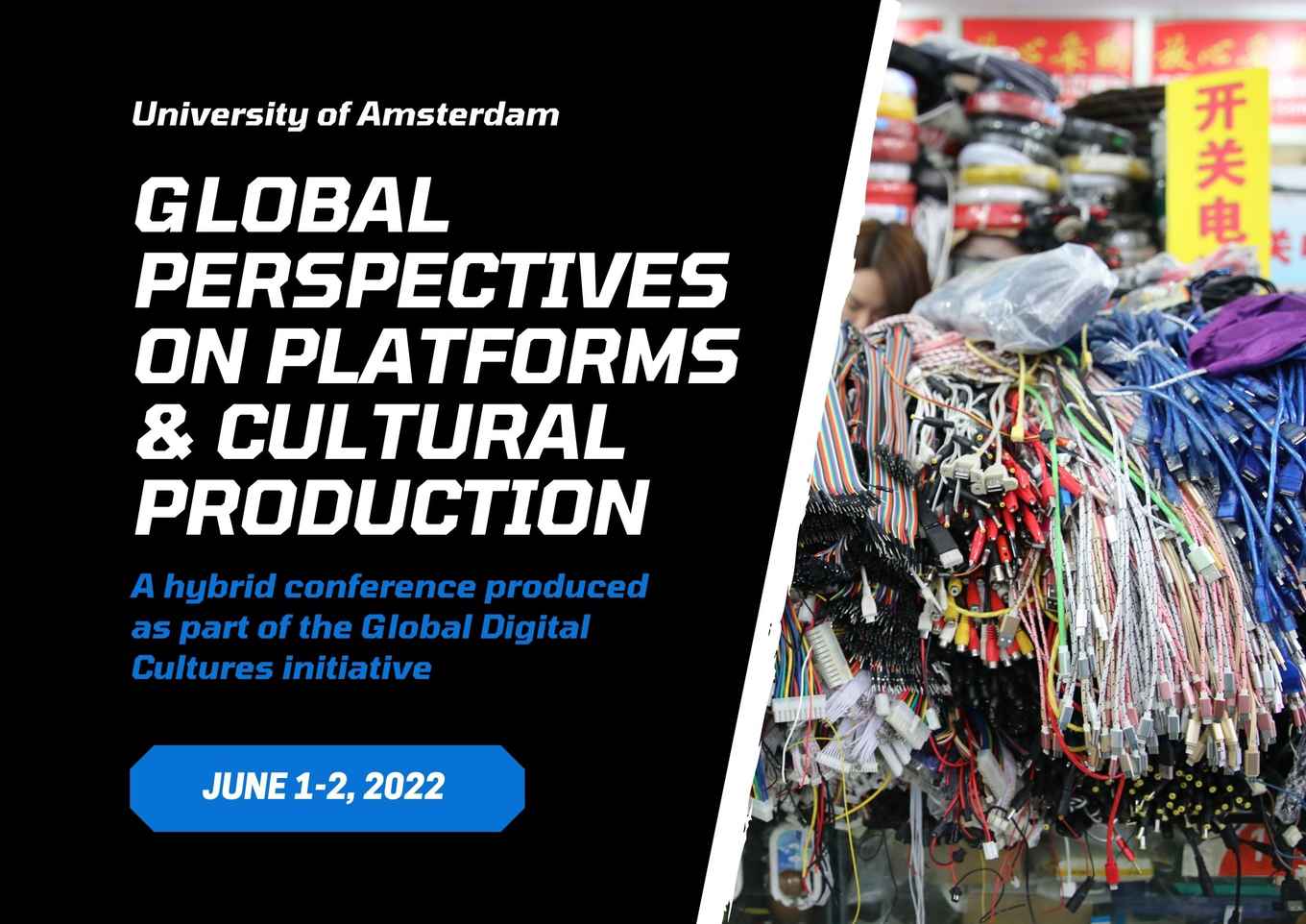Global Perspectives on Platforms and Cultural Production
A hybrid conference convened at the University of Amsterdam, produced as part of the Global Digital Cultures initiative
2 December 2021

Keynote conversations
Amanda D. Lotz, Arturo Arriagada, Aswin Punathambekar, Jack Qiu Linchuan, Jean Burgess, Mark Deuze, Nancy Baym, Rasmus Kleis Nielsen, Taina Bucher
Organizing Committee
Thomas Poell, David Nieborg, Brooke Erin Duffy, Anne Helmond, Jeroen de Kloet, Rivke Jaffe
Call for papers
Cultural producers–from record labels and news organizations to game developers and social media creators—are ever more dependent on digital platforms for the creation, distribution, marketing, and/or monetization of creative and informational content. However, given that the platformization process is neither uniform nor unilateral, it is vital to better understand the socio-cultural, economic, political, and geographic variations structuring contemporary cultural production. As such, this conference will bring together researchers and theorists to examine the global variations configuring the relationships between cultural producers and platforms.
Exploring these variations, we invite conceptual, methodological, and/or empirical contributions that critically interrogate the relationships that emerge in particular cultural industry sectors and/or within specific geographic regions among key stakeholders: platforms, cultural producers, advertisers, data intermediaries, talents agencies, and audiences. Given the broad thematic scope of platform research, this topic warrants an interdisciplinary focus that includes scholarship from fields such as media and communication studies, science and technology studies, critical political economy and economics, sociology, area studies, anthropology, and geography, among others. Such a diverse range of perspectives will illuminate how the impact of platforms traverses different spheres of life, geopolitical borders, and sectoral boundaries.
The conference aims to analyse both the practices and institutional dimensions of platform-based cultural production. For instance, how do transnational platforms and apps, such as Douyin/TikTok, Instagram, Weixin/WeChat, YouTube, Spotify, Twitch, and app stores, affect local markets for cultural products and services? To what extent do such local changes reflect wider shifts in business models, infrastructures, and the composition of audiences? And alternatively, how do local cultures of production and regulatory frameworks shape the platformization of cultural production? What specific labor, creative, and (anti-)democratic practices can be observed in platform-based instances of cultural production within their local/regional contexts?
Addressing such questions, we are especially interested in papers that shed new light on one or more of the following themes:
- Conceptual and critical interventions into platforms, apps, cultural production, and cultural producers, including those that challenge dominant theories of the cultural industries.
- Methodological interventions which address the challenges inherent in researching local/regional instances of platform-dependent cultural production.
- Analyses of domestic platform-dependent industry sectors, such as journalism, game and music production, museums, or emerging ‘platform-native’ practices such as content creation/influencing and streaming.
- Critical political-economic analyses of the viability and/or sustainability of particular modes of cultural production.
- Cultural/media policy and governance frameworks–including content moderation–in particular countries or regions.
- The variation in the scope, scale, and politics of infrastructural resources–APIs, SDKs, etc–and tools provided by platforms and apps to cultural producers.
- Intersectional approaches that are sensitive to the gendered, classed, and racial specificity of platform-dependent cultural production in different parts of the world.
- Inquiries into the changing nature of labor and work in platform-based cultural production, including discussions of precarity, metrics/algorithms, and income structures (i.e., monetization schemes, revenue streams, fan funding, affiliate marketing).
- Emerging practices of creativity, including the aesthetic and affective forms enabled or disabled by specific platforms.
- Research on the evolving relationship between public governance and platform-based cultural production in particular socio-political regimes.
- Formal and informal efforts to resist platformization and/or to develop alternatives to dominant platforms.
Exploring these themes, we not only hope to solicit research from around the world but to also use this research as an opportunity for theory building from a global - rather than a Western-centric -perspective.
Details
Dates & Times
1 June (starting 9:00 AM, CET) until 2 June (7:00 PM, CET), 20221.
The conference is timed to coincide with the end of the ICA conference in Paris (3:30 hour train ride).
Preceding the conference, on 31 May, the Creator Studies Workshop will take place at the University of Amsterdam. The workshop is an ICA post-conference.
Location
University of Amsterdam (downtown) & Zoom
Costs
-
Physical - Full-time faculty: 100 Euro (includes conference dinner & closing drinks)
-
Physical - Non-OECD countries & PhD students: 50 Euro (includes conference dinner & closing drinks)
-
Virtual - 25 Euro
Format
To maximize participation from scholars around the world, we have opted to organize this as a hybrid conference that will simultaneously take place on location (at the University of Amsterdam) and through Zoom. Scholars who are unable to travel to Amsterdam can participate virtually in live panels, which will be scheduled between 9 am and 6 pm CET. All keynote conversations will be live-streamed. For those attending in person, we will organize two social events (conference dinner & closing drinks).
To apply
You can propose an individual paper presentation or a pre-constituted panel with 4-5 paper presentations. To propose an individual paper presentation, submit a 400-500 word abstract (excluding references) and a 100-word bio for each speaker (including email address and affiliation). For a pre-constituted panel, include a 300-500 word rationale, as well as 400-500 word abstracts for each paper presentation and a 100-word bio for each speaker.
Please send your proposals (PDF) to: gdc@uva.nl.
Whether proposing an individual paper or panel, be sure that your proposal clearly articulates:
-
the issue or research question to be discussed,
-
the critical and methodological framework used,
-
the expected findings or conclusions.
Please note that you are not required to submit a full paper for this conference. Furthermore, acknowledging that plans may change, please indicate your likely plans for participation in the conference: physically or virtually (through Zoom). If participating virtually, please indicate from which time zone, so we can try to schedule you at a convenient time.
Deadline for proposals
January 21, 2022.
Decisions will be communicated to the authors by February 18, 2022.